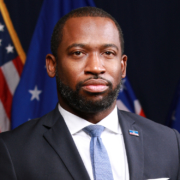New Mexico Voting Rights Act and Election Infrastructure Bill
2023 Ideas Challenge Entry
New Mexico Secretary of State Maggie Toulouse Oliver championed the New Mexico Voting Rights Act (HB4) and the Election Infrastructure Bill (SB 180) which includes a number of critical provisions to expanding ballot access while enhancing ballot integrity.
The Voting Rights Act includes provisions to restore voting rights for formerly incarcerated individuals; strengthen New Mexico’s automatic voter registration system; create a permanent absentee ballot list and expand the use of secure ballot drop-boxes; and most notably, a provision titled the “Native American Voting Rights Act”, the first of its kind in the entire country, which protects ballot access for Indian, Tribal, and Pueblo communities.
SB 180 brings New Mexico’s election infrastructure, allows candidates to pursue digital petition collection options, creates more layers of protection to ensure the integrity of absentee ballots, and reflects the growing preference for absentee voting. It also creates a more substantive process by which New Mexico’s elections are audited to ensure accurate and reliable results, while also including provisions for local officials to verify and streamline those and related processes.
Impact
Both bills were signed into law in 2023 and Secretary of State Toulouse Oliver successfully completed the rule-making process and will phase in provisions of the bills over time. The Secretary of State’s office will use funds from the Help America Vote Act to conduct a study in partnership with the University of New Mexico’s political science department to measure policy impact, voter trends, and voter perceptions of New Mexico’s election practices.








